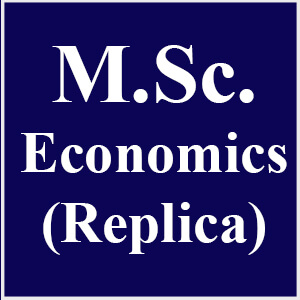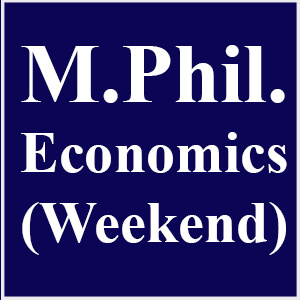M.Sc Economics (Morning & Self-Supporting)
AIMS, OBJECTIVES AND LEARNING OUTCOMES
Specific aims of the M. Sc. Economics Degree are given below:
- Development of sound theoretical knowledge of the subject.
- Application of economic theories and enhancing problem solving ability.
- Coverage of new areas of specialization, as per market needs.
- Preparation for advanced studies leading to M. Phil. and Ph.D.
- Training to produce quality teachers, researchers and policy makers.
- Dissemination of comprehensive knowledge focused at applied and quantitative economics.
- Equip the students with postgraduate level knowledge and skill comparable to the top standards at national institutions.
Course Outline
Term/ Semester/ Year # : Semester I
Credit Hour / Marks : 4
This course aims at providing comprehensive knowledge of consumer, firm, and market theory and their applications. In this course, the students are expected to develop deductive reasoning and comprehend classical methodology pertaining to models of consumer behavior, firms’ decision making, perfect and imperfect market structure, general equilibrium analysis, uncertainty, risk analysis, game theory, and welfare economics. Special importance is placed on developing problem solving skills to the issues related to microeconomics. It is expected that the course would enable its participants to comprehend major microeconomic models which will help in business decision making.
Prerequisite for this course is Principles of Microeconomics theory and intermediate level calculus.
Download Course-Outline
Will be updated soon
Term/ Semester/ Year # : Semester I
Credit Hour / Marks : 4
The main objective of this course is to familiarize students to the fundamental theories and basic models in macroeconomics. The course is covered in two parts. The first part consists of topics such as national income and its determination, consumption, savings and investments, demand and supply of money, and aggregate demand and supply. The topics in this part would be analyzed at an intermediate level. The second part of this course includes advanced level topics. The treatment to topics, such as exchange rates and open economy, long run economic growth, economic fluctuations, and macroeconomic policy debate involves the use of mathematical tools and models. Special emphasis is placed on scrutinizing the models developed in this course on the basis of real time macroeconomic data. The participants of this course would be expected to comprehend key debates over macroeconomic issues and policy-dilemmas faced by various economies.
Prerequisite for this course is Principles of Macroeconomics theory and intermediate level calculus.
Download Course-Outline
Will be updated soon
Term/ Semester/ Year # : Semester I
Credit Hour / Marks : 3
The aim of this course is to equip students with the basic mathematical tools that are useful as an approach to economic analysis. Participants of this course would approach the fundamental theories of micro-economics and macro-economics using mathematical models. In particular, students would learn the static, i.e. equilibrium analysis, comparative-static analysis, and static optimization problems. The participants, after the completion of this course, are expected to understand and analyze economic models and their multivariate relationship, encompassing the economics theories.
Prerequisite for this course is a basic knowledge of introductory-level algebra.
Download Course-Outline
Will be updated soon
Term/ Semester/ Year # : Semester I
Credit Hour / Marks : 3
The main objective of this course is to acquaint students with the basic techniques of statistical methods with strong emphasis on its application to economic theories and principles. The material covered in this course would enable students in not only testing the predictions of economic theories at an elementary level, but it would also help develop the basic skills necessary to take advanced courses like econometrics and growth models. Major topics covered in this course are measures of central tendency, probability, sampling design, estimation techniques, analysis of variance, non-parametric statistics, and Bayesian analysis. It is expected that after the completion of this course, students would be comfortable in handling and analyzing data and use of estimation techniques.
No prerequisite for this course is required. However, basic knowledge of statistics will be an added advantage.
Download Course-Outline
Will be updated soon
Term/ Semester/ Year # : Semester I
Credit Hour / Marks : 3
The main objective of this course is to acquaint students with the economic aspects of Islamic principles and their application to analyze contemporary economic problems. The course helps to build nexus between the Islamic principles and mainstream economic theories. The topics covered in this course range from microeconomic to macroeconomic concepts pertaining to fundamentals of Islamic thoughts. It focuses on, among others, the contributions in development economics of Abu Yousaf to debate on good governance and functioning of market system of Ibn-e-Khuldon. Major topics in this course are Islamic models of finance, banking systems, welfare and distribution of income, zakat and social justice, and current process of Islamization of economic system in Pakistan.
Prerequisite for this course is basic knowledge of holy Qura’an, Hadith, Shariah and economic theory.
Download Course-Outline
Will be updated soon
Term/ Semester/ Year # : Semester II
Credit Hour / Marks : 4
This course aims at introducing students to the quantitative aspects of various econometric theories. This is achieved through providing the students with an understanding of basic econometric theory and models. In particular, the topics covered in this course are: the nature of regression analysis, single- and multi-variable regression analysis, assumptions of the classical regression model, econometric modeling, regression on dummy dependent variable, simultaneous equation models, and time series econometrics. Special emphasis is placed on the application side of this course. Participants would make use of statistical softwares to undertake regression analysis. Students after the completion of this course are expected to be comfortable in data analysis, apart from contributing to empirical research and analyzing projects.
Prerequisite for this course is intermediate-level knowledge of calculus, statistics, and economic theory.
Download Course-Outline
Will be updated soon
Term/ Semester/ Year # : Semester II
Credit Hour / Marks : 4
This course aims at preparing students to strengthen their research abilities. The contents of this course are designed to facilitate research. Apart from learning research techniques and developing such necessary skills, the participants of this course would also develop scientific and rational thinking to produce new knowledge. Students will be taught to build and estimate econometric models. Besides, application of economic theory is taught in such a way so that student can test and empirically verify economic theories and models.
Prerequisite for this course is intermediate-level knowledge of economic theory, statistics, and econometrics along with some degree of writing and computer skills.
Download Course-Outline
Will be updated soon
Term/ Semester/ Year # : Semester II
Credit Hour / Marks : 3
This is a course about the understanding of the economies popularly known as developing countries. In this course, students are introduced to the conceptual meaning of economic development while distinguishing it from economic growth and the common characteristics of developing countries. The course develops necessary abilities in the students to generalize and apply development economic theories to solve the most pressing problems of the developing world. It helps to understand structure and functioning of institutions, markets, and policies adopted in the developing countries to accelerate welfare of their citizens. The course covers theories of economic growth and models and their application pertaining to contemporary issues of the developing world, such as poverty, income distribution, unemployment, and macroeconomic destabilization. After the completion of this course, students are expected to contribute to the society with their opinions about the development problems from various forums of public and private organizations.
A considerable knowledge of introductory-level macroeconomic and microeconomic theory is an advantage; otherwise no special prerequisite for this course is required.
Download Course-Outline
Will be updated soon
Term/ Semester/ Year # : Semester II
Credit Hour / Marks : 6
Download Course-Outline
Will be updated soon
Term/ Semester/ Year # : Semester III
Credit Hour / Marks : 4
Download Course-Outline
Will be updated soon
Term/ Semester/ Year # : Semester III
Credit Hour / Marks : 4
Download Course-Outline
Will be updated soon
Term/ Semester/ Year # : Semester III
Credit Hour / Marks : 4
This course is designed to familiarize students with international economics. It is divided into two parts. The first part covers the trade theory, and the other international finance. Emphasis in this course is on the rigorous treatment of traditional and current trade and exchange rate theories and models. Models of gains from trade, pattern of trade, international flow of factors of production, trade related competitive theories, liberalization reforms, balance of payments problems, determinants of exchange rate, and future markets are some of the topics covered in this course. Furthermore, implications of international flow of funds and debt crises are covered in depth. By providing training-built analytical ability, which is particular for policy formulation, this course would prepare students for jobs in both public and private sector organizations.
Prerequisite for this course is intermediate-level knowledge of economic theory and mathematics.
Download Course-Outline
Will be updated soon
Term/ Semester/ Year # : Semester III
Credit Hour / Marks : 6
Download Course-Outline
Will be updated soon
Term/ Semester/ Year # : Semester IV
Credit Hour / Marks : 4
It is a compulsory course. Microeconomic theory course is pre-requisite for this course. Following major topics are covered in this course: General Equilibrium Theory: Multi market equilibrium in a competitive setting: Walras Law; Existence of equilibrium; Stability of equilibrium; Money in a general equilibrium setting. Technical and allocative efficiency and case of exchange economy. Linear programming technique to general equilibrium theory (Activity Analysis). The Von-Neuman, the input-output Model. Pareto optimal principle, production and resource allocation and efficiency of Perfect Competition. Measurement of Changes in Welfare: Consumer Surplus, Compensation Principle. The Theory of Social Choice: Social welfare function. Arrow’s Impossibility Theorem, Marginal cost pricing. Joint Products, Externalities, Income distribution and compensation principle. Theory of second best and its application in Public Sector and international trade.
Download Course-Outline
Will be updated soon
Term/ Semester/ Year # : Semester IV
Credit Hour / Marks : 4
It is a special applied course, which covers different aspects of economic theory and its application. The course is offered in the last semester. In this course, estimation of econometric models and applied economic research is taught. For this purpose, students are required to apply the knowledge and theory to produce a research paper, which is substitute to M.Sc. thesis. Completion of this course provides confidence among the students to embark upon research on important national and international economic issues. This course is compulsory for all those students who do not opt for M.Sc. thesis.
Download Course-Outline
Will be updated soon
Term/ Semester/ Year # : Semester IV
Credit Hour / Marks : 4
Download Course-Outline
Will be updated soon
More Information
Merit = 69
Reserve = 10
Total = 79
2 Year
Semester System
September / October
Eligibility
BA / B.Sc Second division marks in Economics
OR
B.Com Second division marks in Economics
Seat Distribution (Merit)
BA / B.Sc 55
B.Com 05
Graduates with PGDAE (PU) 09
Admission Criteria: Basic
Additional Marks:
Hafiz-e-Quran: 20 Marks
Subject Marks:
• Marks of Economics out of 200 Marks
• Statistics or Mathematics (Elective or Optional):
• ¼ marks of the subject in which the marks are higher
• Statistics or Mathematics of 100 marks in B.Com:
• ¼ marks of the subject in which the marks are higher.
• For PGDAE Graduates:
Basic Criteria plus total marks obtained in PGDAE out of 1000.
Merit Formula:
Academic record 100%
• The applicants on extra curricular seats must fulfill the eligibility criteria for admission of the Department of Economics.
• If any merit seat for B.A./B.Sc. candidates remains vacant after fourth/final list, it will be filled from PGDAE candidates.
——
Semester I= 14,480
Semester II= 11,130
Semester III= 12,980
Semester IV= 11,130
Department of Economics
Economics and Management Sciences


